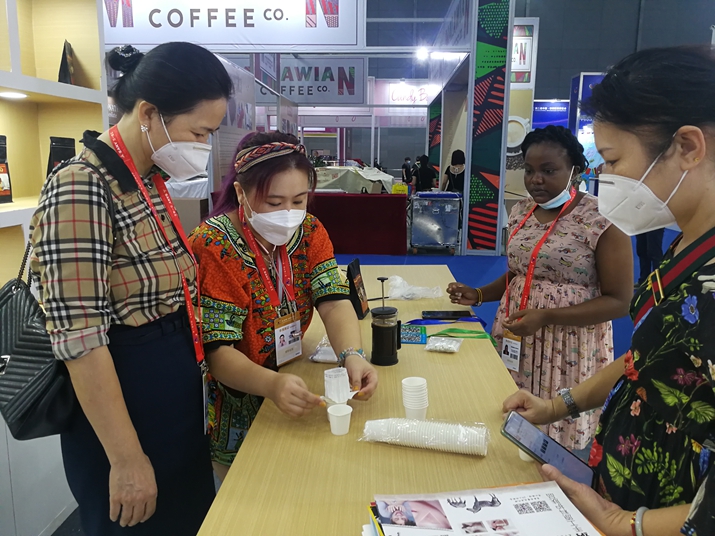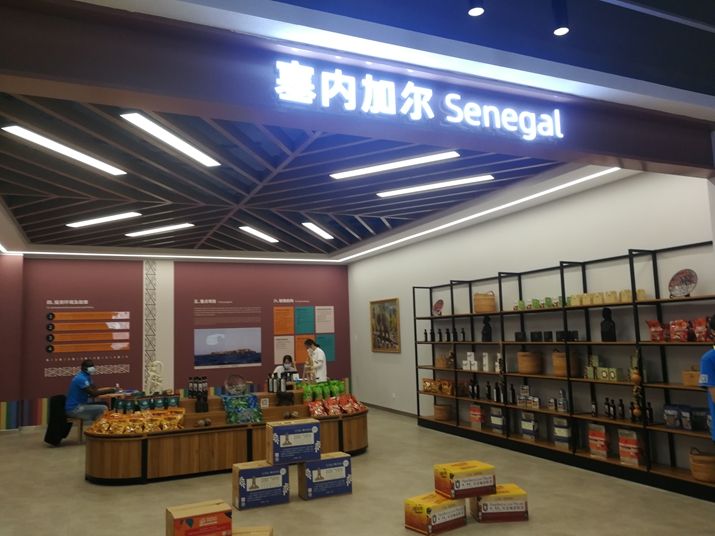|
||||||||||
| Home Nation World Business Opinion Lifestyle ChinAfrica Multimedia Columnists Documents Special Reports |
|
||||||||||
| Home Nation World Business Opinion Lifestyle ChinAfrica Multimedia Columnists Documents Special Reports |
| ChinAfrica |
| CAETE serves as a valuable platform to implement FOCAC initiatives and promote economic and trade cooperation between China and Africa |
| This year, exhibitors and goods representing 12 industries from 47 African countries attended the CAETE. Onsite or remotely, 135 projects with a value of $22.9 billion were signed, covering agriculture, mining, manufacturing, infrastructure, e-commerce, and finance |
| By Ge Lijun Web Exclusive ·2021-10-19 |

Visitors taste Ugandan coffee at the second CAETE (GE LIJUN)
Despite the recurrent outbreaks of COVID-19, the Second China-Africa Economic and Trade Expo (CAETE) in Changsha, Hunan Province, in late September attracted over 900 Chinese and African businesses.
"CAETE is a new platform to promote the implementation of the FOCAC economic and trade initiatives, as well as a new window for local cooperation with Africa," Yang Jiechi, a member of the Political Bureau of the Communist Party of China (CPC) and Director of the CPC Central Committee's Office for External Affairs, said at the opening ceremony of the expo on September 26.
Chinese President Xi Jinping announced the establishment of CAETE at the Forum on China-Africa Cooperation (FOCAC) Beijing Summit in 2018, and the first edition was held successfully in June 2019.
This year, exhibitors and goods representing 12 industries from 47 African countries attended the CAETE. Onsite or remotely, 135 projects with a value of $22.9 billion were signed, covering agriculture, mining, manufacturing, infrastructure, e-commerce, and finance. The volume of online transactions exceeded $38.3 million, according to official statistics.
New priorities
China-Africa trade volume reached $187 billion in 2020, according to the Chinese Ministry of Commerce (MOFCOM). For the past 12 years, China has been Africa's largest trade partner. The trade with China accounts for more than 21 percent of Africa's overall international trade.
Agriculture is an important area of economic and trade collaboration between the two countries. Over the last three years, China's agricultural imports from Africa have increased at an annual rate of more than 14 percent. China has surpassed the United States to become the continent's second largest agricultural export destination.
Xie Yajing, an official of MOFCOM's West Asia and Africa Department, noted during the CAETE African Agricultural Products Forum that African citrus, sesame, and cocoa account for more than half of China's agricultural imports. Currently, there are almost 350 agribusiness and food items in Africa that are eligible for export to China.
"Coffee, cashew nuts, chocolate, wood, rubber, seafood, dried chilies, sesame, and peanuts stand out," said Cao Derong, head of the China Chamber of Commerce of Import and Export of Foodstuffs, Native Produce, and Animal By-Products. For example, Africa supplies 80 percent of China's sesame.
"Madagascar's rice farming is being actively supported by China. The average production of hybrid rice has increased from 2.5 tons per hectare to 8 tons as a result of hybrid rice technology transfer, boosting local farmers' income," Madagascar's Minister of Agriculture and Livestock Harifidy Ramilison stated.
Construction is an essential aspect of China-Africa economic and trade cooperation under the Belt and Road Initiative, according to He Song, Deputy Director General of MOFCOM's West Asia and Africa Department. During the expo, 17 collaboration projects totaling more than $6 billion were finalized.
New fields of collaboration have also emerged in recent years, such as e-commerce, mobile wallets, media, entertainment, and logistics. At a CAETE seminar on young innovation and entrepreneurship,Qiu Yusheng, General Manager of the Investment Department of mobile phone maker Transsion, remarked, "This is the perfect time to set up mobile Internet [services] in Africa."

Senegalese pavilion in the Gaoqiao market in Changsha (GE LIJUN)
A long-term partnership
China-Africa collaboration has continued to deepen over the last three years. Despite the pandemic's impact, there is a strong sense of perseverance and vitality.
Last year, Chinese direct investment in Africa totaled $3 billion, and from January to July this year, it reached $2.07 billion. In Africa, more than 3,500 Chinese companies are involved in diverse business operations. Among Chinese investors in Africa, private firms now account for 70 percent of the total. "Africa has emerged as a new investment destination for Chinese companies," Yang stated.
Hunan Anbang Pharmaceutical Co., founded in September 1994, is one such company. It is dedicated to supplying traditional Chinese medicine products for the prevention and treatment of COVID-19 in African countries. The company is currently in the process of registering in Zimbabwe and Chad. The procedure for entering the African market has been eased thanks to the FOCAC and CAETE. The Hunan provincial government has introduced many measures, including mutual acceptance of norms. Chen Feibao, Chairman of Hunan Anbang Pharmaceutical Co., told ChinAfrica that these factors are positive to the company. "We intend to construct factories [in Africa] in the near future."
According to Baidy Agny, First Vice President of Senegal's Economic, Social, and Environmental Council, various economic and financial cooperation instruments under the FOCAC allow the Chinese Government to provide substantial resources to African countries, which are used for cooperation projects in various sectors, such as industry, agriculture, and health.
Recently, the China-Africa Business Council presented a report on Chinese business investment in Africa. Chinese companies have made significant contributions to enhancing industrialization, promoting employment, and improving people's livelihoods in the region, and have become one of the driving forces behind the continent's inclusive development.
At the CAETE inaugural ceremony on September 26, the Alliance for Corporate Social Responsibility of Chinese Enterprises in Africa was officially formed as one of the measures of the eight projects of the FOCAC Beijing Summit. The association includes around 1,700 Chinese businesses in Africa. According to the alliance's mission statement, it will actively guide Chinese enterprises' social responsibility in Africa, support the coordinated development of Africa's economy, society, and environment as well as the improvement of people's livelihoods, and make further contributions to building a stronger China-Africa community of common destiny.
Comments to glj@chinafrica.cn
| About Us | Contact Us | Advertise with Us | Subscribe |
| Copyright Beijing Review All rights reserved 京ICP备08005356号-5 京公网安备110102005860号 |